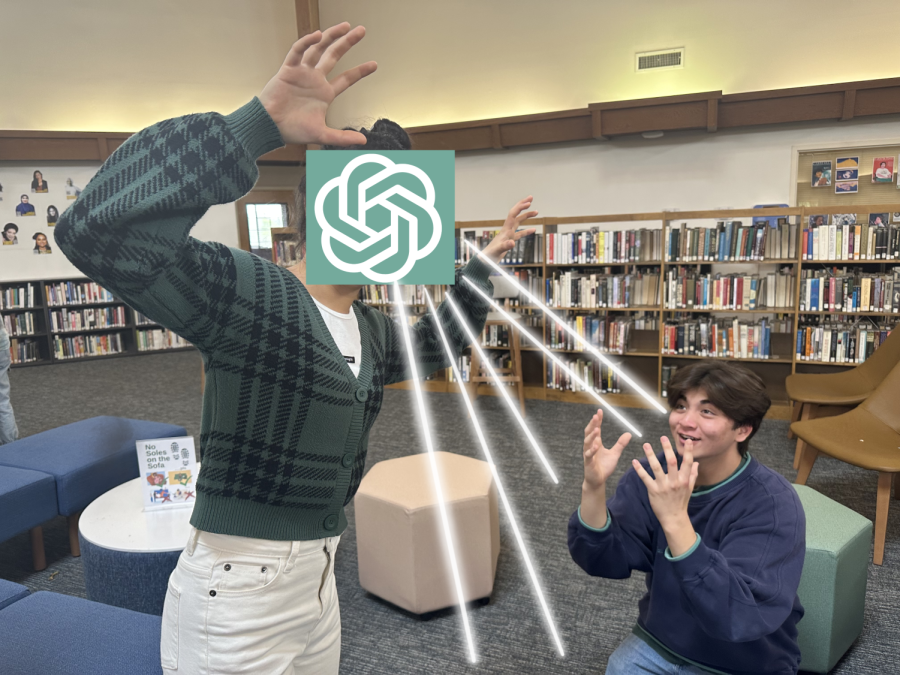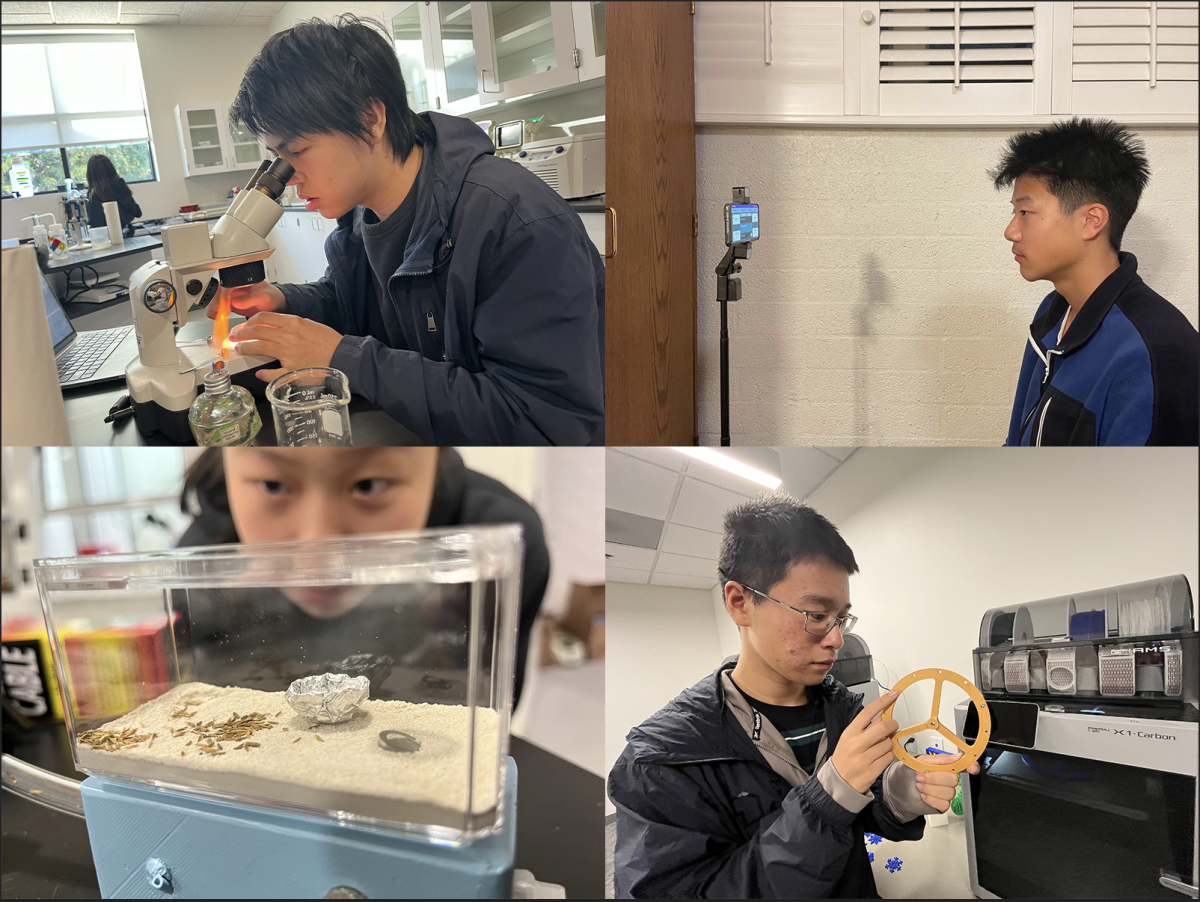The newsroom hums with the familiar sounds of keyboards clacking and phones ringing as reporters scurry about, gathering information for their latest stories. But amidst the usual organized chaos, something is different. In the corner of the room, a sleek black box sits silently, its screen glowing softly.
It is the latest desktop computer, capable of running the most advanced artificial intelligence programs and designed to analyze data and generate news stories at lightning speed. As the day wears on, the AI churns out article after article, leaving the human journalists struggling to keep up.
Is this the future of journalism? A world where machines take over the newsroom, leaving human reporters lost in a new digital landscape?
“AI writing tools can be fun to play with,” said Dr. Mark Lauer, Humanities Department faculty and past adviser to Webb’s literary magazine, Breakfast. “However, the process of writing itself nurtures thinking and creativity in your mind.”
In a world where technology is advancing rapidly, it’s not surprising that AI has made its way into the field of journalism. ChatGPT, a large language model trained by OpenAI, can generate texts that mimic human writing. However, while ChatGPT may seem like a quick and efficient solution for producing articles, for now, journalists can rest easy with their jobs.
“When you go out to a teacher, to your peers, to friends, family, people in the community, you’re creating unique social bonds that might not have existed before,” said Dr. Mark Dzula, Director of Teaching and Learning Resources and the Webb Canyon Chronicle’s (WCC) adviser. “It’s educational not only for you as the journalist, but also educational for your participants and your audience.”
At the heart of the issue is the fact that human journalists possess a range of unique skills that AI simply cannot match. For starters, journalists have the ability to understand context and nuance, something that ChatGPT can only approximate based on patterns and statistical models.
While ChatGPT may be an impressive technological advancement, it cannot replace the unique skills and abilities of human journalists. As Dr. Dzula notes, AI tools like ChatGPT can be helpful for information gathering and outlining, but when it comes to actually writing the article, it is hard to beat a human journalist who has the skills and experience to craft a compelling story.
At the center of journalism is its humanity — that’s where AI, at the moment, falls short. Time to wipe that bead of sweat from your forehead, because that’s a relief. Or is it? What if the entire article up until this point, excluding quotes and edits, had been written using ChatGPT?
Because that’s exactly what we did. After we asked the AI to “write an article about the importance of human journalists in the age of ChatGPT,” an article that would usually take the publication a few days or weeks to produce was generated in seconds. And after two cycles of generation, the language model had written a “compelling lede” and incorporated a variety of sentence structures which, when run through GPTZero, a counter-website created to detect the presence of artificial intelligence in writing, were determined as “likely to be written entirely by a human.” So, ChatGPT can sound like us and do it faster, too? It just seems like they could do our jobs better than we can.
What is the point, then, of human reporting? As ChatGPT becomes more and more intelligent through practice, it seems like real journalism would become obsolete. So, why not give it up right now? Well, briefly: artificial intelligence cannot be us.
Although the first part of our article has been initially generated by ChatGPT, it was modified through content selection, face-to-face interviews, and editing — the human process of selecting content that makes Chat GPT’s writing cohere better with our focus. AI alone could not synthesize information, liaise with editors and the journalism advisor, and consider the impact of our words on the community.
The truth is, journalism is not just about delivering relevant, accurate information –– a goal still currently unachievable by ChatGPT. It is a powerful opportunity to establish human relationships. Artificial intelligence cannot replace the heartwarming interactions between journalists on the ground and the subjects they are highlighting, AI may be able to generate a list of stakeholders, but it cannot interview them in a flexible manner. Thus, when asked to generate an article, they can only “report on reporting,” without conducting any new or original investigation.
This means that the jobs of field journalists are not in danger. As ChatGPT scrapes its information from already existing primary sources of information through its “transformer” architecture, the creators of those primary sources — namely, field journalists — are the foundation to its function. So if field journalists would not become obsolete, why would we need non-field reporters?
The journalism process benefits humans with a value unmatched by artificial intelligence. From pitching an article idea to its publication, journalists constantly practice important skills such as interacting with stakeholders and gauging important information for the community. The investigation process enables them to better understand the situation incrementally, as they salvage clues through research and interviews to finally unveil the big picture –– like assembling a jigsaw puzzle.
“Part of what we’re doing, especially here at the WCC, is developing a set of skills, so even though ChatGPT could create content, the value in our experience comes from talking to people –– when the journalist is making connections in understanding people and creating new modes of shared meaning,” Dr. Dzula said.
Most importantly, ChatGPT doesn’t know Webb intimately like WCC reporters do. It cannot experience the community’s exhilaration when Claremont welcomes its first snow; it cannot reach out to new faculty members and make them feel seen by student journalists; it can never fully encapsulate our love, stress, concerns, aspirations, and hope for the future in a humane manner. Only Webbies can do that, and only Webbies should do that.
Relinquishing AI-generated news from our daily digest is not an option –– it is a must-do. Although ChatGPT may seem like a convenient option in the short term, it fails to satisfy the very human interactions that render journalism precious. Yes, as humans, we will write with grammar mistakes, use banal or overly decorative language, carry inevitable biases in our reporting despite our best efforts to remain objective, the list goes on. But one thing remains true, and that is our passion for finding the most relevant stories, willingness to connect with strangers, and genuine love for writing –– and no matter how advanced ChatGPT becomes, it can hardly replace our authenticity.





![All members of the Webb Robotics Winter season teams taking a group photo. Of note is Team 359, pictured in the middle row. “It was super exciting to get the win and have the chance to go to regionals [robotics competition]” Max Lan (‘25) said. From left to right: Max Lan (‘25), Jerry Hu (‘26), David Lui (‘25), Jake Hui (’25), Boyang Li (‘25), bottom Jonathan Li (’25), Tyler Liu (‘25)](https://webbcanyonchronicle.com/wp-content/uploads/2025/03/Screenshot-2025-03-10-at-2.41.38 PM.png)











